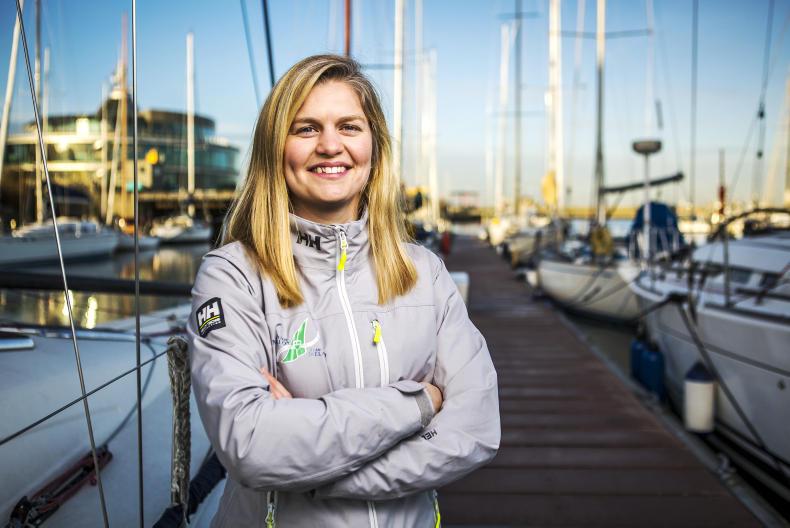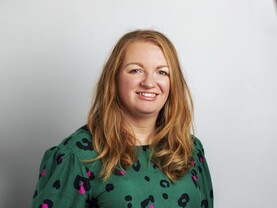Out of France, turn left, down the bottom of the Atlantic, turn left, go kind of around Antarctica basically; and back up the Atlantic,” says Joan Mulloy, matter-of-fact, as if directing a lost driver to the nearest town or petrol station.
Except the route that she is describing is that of the Vendée Globe: a non-stop, around the world, solo sailing race.
And this 32-year-old farmer’s daughter is determined to become the first Irish person to complete it in 2020, having left her job in the oil and gas industry- even though it meant taking a 90% pay cut- to make her dream a reality.

Originally from Westport, Co Mayo, Joan’s father Michael runs Blackshell mussel farm in Clew Bay and is chairman of the Irish Shellfish Association, while her mother Linda is a stained glass artist.
“I think that really instilled in me a sense you get what you work for,” says Joan of their influence.
Still, she stresses that sailing was only ever a “hobby”, completing her first course with Mayo Sailing Club at eight years of age and continuing in her teens before moving to Galway to study civil engineering at NUI Galway (NUIG). While she loved her degree, however, she soon discovered that office life was just not for her.
“I worked in offshore oil and gas doing computer analysis for pipelines off-shore and that was great,” she explains, “but after a while, just the ‘desk job thing’ wasn’t really suiting me.”

While mulling over her next move, Joan went travelling, before returning home to work on the mussel farm, continuing to sail in her spare time.
In 2012, however, she was invited to take part in a round Ireland off-shore sailing race with a crew from NUIG, which proved to be a real turning point.
“That was the start of, ‘Wow, I really love this side of sailing,’” says Joan of the “off-shore” dimension, where you can find yourself at sea for days-or weeks- at a time.
“It’s real endurance,” she continues. “You had to think about the weather and the strategy and the tides and the other boats on a much bigger scale and I really loved all of those different aspects of it.”
That experience put Joan on a new career path, when she was offered a job as part of a professional crew; even though the rate of pay was about 90% less than she would have earned as an engineer.
For Joan, however, heart won over head.
“In my mind, I’d rather take that risk than not take it and always be wondering, ‘What if?’” she says simply.
Joan spent a year sailing around Ireland, Britain, the Atlantic and the Mediterranean with the crew, before taking a job with a British solo sailing team where she worked as the fleet captain, looking after the boats for two years.
Last year, however, she decided to walk away from another regular pay cheque to launch her own career as a professional solo off-shore sailor; with the goal of competing in the Vendée Globe in 2020, and become the first Irish woman to sail solo around the world in doing so.
“You have to have a goal, and for me the pinnacle of solo offshore sailing is to do the Vendée Globe,” says Joan, who explains that only seven women in history have completed the race, the most famous being Ellen MacArthur, who took second place in the 2000/2001 event in 94 days, four hours and 25 minutes.
“And actually no Irish person has ever completed it,” she adds.
Preparation
But how does a person even prepare for a 90-day-plus solo sailing adventure?
For Joan, her first big stepping stone was to complete La Solitaire URGO Le Figaro last summer, which is a highly competitive race from France featuring many of the skippers who have already sailed in the Vendée.
“It’s like you get to go and do a county championship match with the guys who are winning the All Ireland,” says Joan. “You get to peg yourself against them and see how am I getting on, how good are they, what’s the level?”
Raced from port to port over four legs- each three or four days long- the Solitaire is not just a test of sailing skill, but of endurance; both physical and mental.

“We sail non-stop day and night until we get to the finish and when you sail by yourself obviously you have to keep an eye on the navigation, on the safety of yourself and the boat and then you have to make the boat go fast and you have to think about the tactics and the strategy of the race as well and the weather,” explains Joan, though of all the challenges, she rates sleep deprivation as the most difficult, as realistically, you can only leave your boat on autopilot for 15 minutes at a time.
“I think I got around two, maybe three hours sleep in every 24 hours, so by the time you get in, you’re quite exhausted, and you only have one or two days to recover and you go again. So that’s another reason why the Solitaire is such good training because it’s really gruelling; like by the time you get to the fourth leg, you essentially haven’t slept properly for three weeks.”
Joan, however, proved her mettle when a technical problem at the start line of the second leg from Northern France to Spain across the Bay of Biscay meant that she was three hours behind everybody else by the time she set sail.
“And in a race like that where everyone is finishing within minutes of each other, three hours is huge,” she says; yet she was determined that she would catch up.
“I didn’t sleep for the first night and the day and you’re just fighting, fighting, fighting. Every little gust, every little eddy, every little wave, you’re trying to get the most out of it,” explains Joan, who did manage to overtake four boats and was presented with the “Special Adversity Award” for her efforts, and eventually finished fifth in the category for first-timers in the overall race; becoming the first Irish woman to ever complete the race.

That said, the Solitaire is like a “sprint” when compared to the “marathon” that is the Vendée, which is held every four years. Like Le Solitaire, sleep will be at a premium, most likely snatched for minutes at a time on a bean bag or a camping mat on the floor of the cockpit. Her diet for 90 days will consist of de-hydrated meals- like spaghetti Bolognese heated up with boiling water- with the odd Pot Noodle as a guilty pleasure. One bucket will function as a shower and one as a toilet, with a change of clothes probably once a week.
“Talcum powder is your best friend,” says Joan wryly.
And while she will have a satellite phone and email for communication, Joan will be completely on her own when it comes to dealing with whatever Mother Nature throws at her or any technical issues on the boat.
So how does she keep her cool in a storm, for example?
“It’s scariest when you’re by yourself obviously, but when I’m there by myself often I’ve been anticipating it for a long time, so usually those kinds of winds are forecasted reasonably accurately,” she explains. “So usually I’ll try to sleep as much as I can the night before, make sure I’ve eaten loads, make sure I have food in accessible places in the cockpit in case I have to steer for a long time and make sure that I have my sails up, that my head torch batteries are charged. You just try and prepare everything on the boat; and they (the storms) don’t last forever, usually.”
Finance
The biggest challenge when it comes to taking part in a major offshore solo sailing race, however, is not confidence or courage, but securing corporate sponsorship.
For Le Figaro, for instance, Joan had to raise between €300,000-€350,000 to fund the boat and on-shore support team, with the help of sponsors including BIM, who partnered with her to promote the “Taste The Atlantic” seafood trail.
For the Vendée, however, Joan will realistically have to get at least €3.5 million in order to fund her support and maintenance team, and to buy the IMOCA 60 boat necessary to compete in the event.
“So I’m racing currently in like, say it’s a 2019 VW Golf. So they’re really good boats and really competitive and I’m racing against another 40 2019 VW Golfs and everybody is using the same. But when you go into the Vendée Globe, you’re racing a Formula One car,” she explains.

While acknowledging that it’s a “massive” target, however, Joan remains confident that she can find commercial partners for whom it makes business sense to back her bid from a marketing and brand ambassador perspective.
“I always say if I don’t believe it’s going to happen, nobody is going to believe it, so I am so sure in my head it’s going to happen,” she says.
“I’m going to find it bit by bit, even if it’s ten grand if I have to do that 350 times, 1,000 times, then that’s how we’ll do it.”
What has been heartening, however, is the grassroots support Joan has received in Mayo, as well as from the Irish sailing community, as she works towards notching up the miles needed to qualify for the Vendée, as well as training to return to Le Solitaire in summer 2019.
“Somebody asked me recently what the two biggest challenges were and I think finding sponsorship and believing in yourself, because just turning around and saying to yourself, ‘I can do this’ is not easy,” she admits.
My dad just sent me a little quote that said, ‘I know I can, I know I can’
“And actually having all those people turn around and say, ‘I believe in you so much that I’m going to give you some of my hard earned money’ or ‘I’m going to give you my support’ or ‘I’m going to look after your boat for you or drive you here’ or just send you an email saying, ‘I think you can do this’, that was such a big deal for me.”
But maybe it is the support closest to home that means the most when out so far at sea.
“My dad just sent me a little quote that said, ‘I know I can, I know I can,’” smiles Joan, of her father’s take on the “I think I can” mantra from the children’s story, The Little Engine That Could.
And come hell or high water, Joan Mulloy is on the crest of a wave.
For further updates and information on Joan’s upcoming sail, visit https://joanmulloyracing.com/ or email joan@joanmulloy.com






 This is a subscriber-only article
This is a subscriber-only article










SHARING OPTIONS: